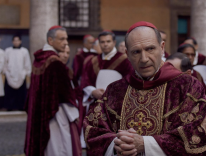Hartford Stage’s production of Romeo and Juliet countered the effects of an icy Sunday afternoon. Happily the focus on young love had an effect on the age of the audience. There were many below sixty-five. The stage design was puzzling – an apparent back drop of large forms for pouring concrete, for some reason inset with flower sconces and lights – but then with the help of program notes it became clear. We were looking at crypts, stacked tomb enclosures that reached to the height of the curtain. Mourners who formed a mute chorus populated that back of the stage in many of the scenes, attentive to the players down-stage. We were not to forget the trajectory of the action: the maw of death. My wife had to remind me that the costumes and design were inspired by post-war Italian neo-realist films (She read the program carefully.), and so the initial scene involving the brawl between the Monatgues and Capulets (“I do bite my thumb.”) made sense: street thugs taunting each other with shining knives, not sword blades.
Darko Tresnjak is a formidable director and designer. He made the setting work, certainly more so as the play evolved. Whether this is a look back to West Side story or not, the rivalry between the houses makes sense in a mean street context.
On the simplest level, I am continually admiring of actors’ feats of memory in learning lines. Surely the energy of passion has to drive the delivery, especially with the overwrought desires and fears of the speeches. Anyone who remembers reading Romeo and Juliet in school will attest that Shakespeare doesn’t always yield sense easily – especially in the punning interchanges of courtly love or in the confessions of longing or despair.
I have attended with former students many performances of Shakespeare. Some had better been skipped for the negative effects they had. If I can borrow an analogy from musical performance: a costly, rare instrument will disappoint when played with poor execution. Shakespeare’s verse will “tell” only when it is carried well. Romeo, Mercutio, and Friar Lawrence in this production were immediately convincing. Their delivery furthered sense. The language, because it is Elizabethan and because it is verse, cannot sound “natural” but it can “tell.” It was Juliet, fluent, dramatic, and beautiful whom I could not really appreciate: the cadences of her speech caused something by way of interference with the sense of her lines– as patterns of waves can cancel one another out. Her performance was affecting, but then there were moments where her speech did not register, except in the emotional tenor of her expression.
I say this not principally to stand in judgment, but rather as a reflection on the difficulties that four hundred year old plays cause for actors. There are obviously unique demands arising from the complicated arguments of the text. We go to the theater for revelations when we see plays often staged: hence the challenging settings, the alteration of time period, the interpretation of character. But the hard work lies with the words. We need to hear them as in Hamlet’s directions to the Players: “Speak the speech, I pray you, as I pronounc'd it to you, trippingly on the tongue.” In whatever guise Shakespeare uses Hamlet in addressing the Players, he demands, to borrow a phrase, “articulate energy.” Only that will cause us to suspend disbelief and bow to the tragedy of Juliet and her Romeo. To strain to hear sense is to strain out the poetry.

